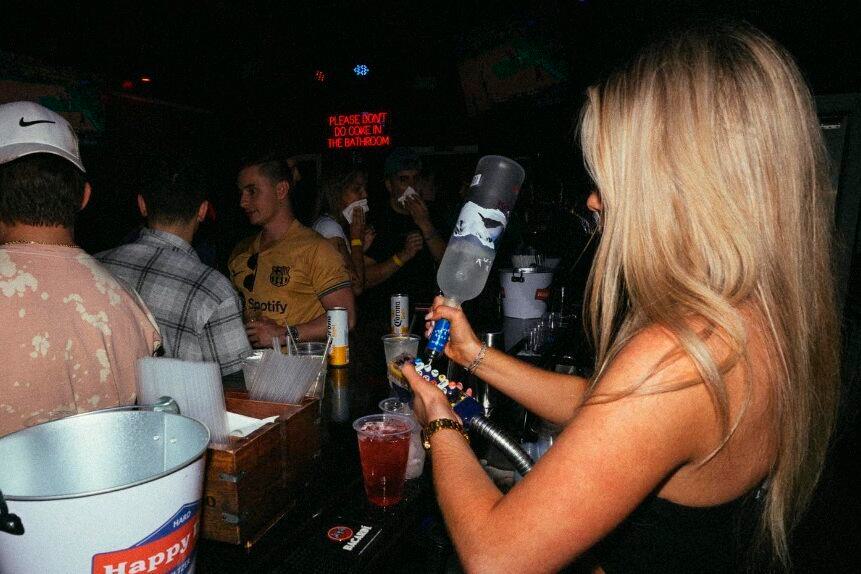One bar owner on The Strip in Tuscaloosa told 1819 News last week that his bar will lose as much as 35% of his profit if city officials require bars to stop selling alcohol earlier.
The Strip is home to several bars frequented by University of Alabama students, such as Rounders and the Bear Trap. Tuscaloosa contains 39 bars and gastropubs, but the vast majority are concentrated across six city blocks.
City officials have been searching for solutions to alleviate the strain placed on the police force at The Strip since a shooting resulted in the death of a 23-year-old female and the arrest of a University of Alabama basketball player in January landed the city in the national press.
The Tuscaloosa City Council has already placed a moratorium on approving new alcohol vendor licenses until the end of the year. Though they took no formal action, city council members discussed forcing bars to stop serving alcohol last month.
Behind this proposition was Councilman John Faile. Faile spoke to 1819 News last week, suggesting The Strip is holding up a police force already short-staffed due to a national police shortage.
Currently, bars and lounges in Tuscaloosa can serve alcohol until 2 a.m. on Saturdays and weeknights and by 2:45 a.m. on Fridays. On Sundays, bars must close by 10:15 p.m. Faile initially suggested the bars should stop selling alcohol by midnight.
But Edgar Padilla, owner of Sideline Bar, said this would be detrimental to his profit margin and wouldn’t do anything to solve the problem it aims to address.
Other bar owners already suggested they could stand to lose tens of thousands of dollars on a Friday or Saturday night and even millions in annual revenue if forced to stop selling alcohol at midnight. This could also result in fewer hours and less pay for cooks, security guards and other workers and would mean less tax revenue for the city.
Padilla said he could lose from 30% to 35% a night — money the city no longer gets to tax.
“Everyone is forced out of the bars basically at closing time,” he explained. “The city is just trying to figure out a way to mitigate some of that crime that they say is being committed … Shutting the bars down two hours earlier is just going to move up the time for all of that.”
Faile responded to similar arguments last week, suggesting that the revenue the city would potentially lose is currently being lost paying police overtime.
Padilla has owned Slideline for five years. He said he hadn’t seen any major crimes during that time and that most of the problems faced by police were loitering and overcrowding.
Yet, he suggested that January’s shooting has something to do with the increased interest in imposing more regulations on The Strip by city officials.
“[The shooting] was such a high-profile thing obviously because of who was involved,” Padilla said. “... I think that what the city is looking at is like ‘we need to do something’ because that’s bad press, bad publicity for the city, and obviously people come to Tuscaloosa. They want people to come here and feel safe. I think that the ultimate goal is to make the city seem more safe.”
“The ones who are proposing this rule change are never out there at that hour, so they don’t really know what’s going on or what’s out there,” he continued.
Nevertheless, Padilla said he doesn’t want the public to see this as a Tuscaloosa bars vs. Tuscaloosa City Council ordeal. He said he and other bar owners have been communicating with city officials, including the council, Tuscaloosa Mayor Walt Maddox and the Tuscaloosa Police Department.
In fact, Padilla and the other bar owners already formed a “Bar Association” two years ago.
He said he trusts the officials just want to keep people safe but doesn’t think forcing bars to stop selling alcohol earlier will help.
“I think the city council, they understand kind of a little more now about the impact it would have on us and them,” he suggested.
Padilla insisted he’s confident bars won’t end up having to close alcohol sales at midnight. He said he thinks they’ll have to stop selling alcohol an hour earlier on Friday, more than likely.
“We enjoy being a city that people like coming to,” he said. “We want to keep it that way, obviously, because it’s good for business.”
To connect with the author of this story or to comment, email will.blakely@1819news.com or find him on Twitter and Facebook.
Don’t miss out! Subscribe to our newsletter and get our top stories every weekday morning.










